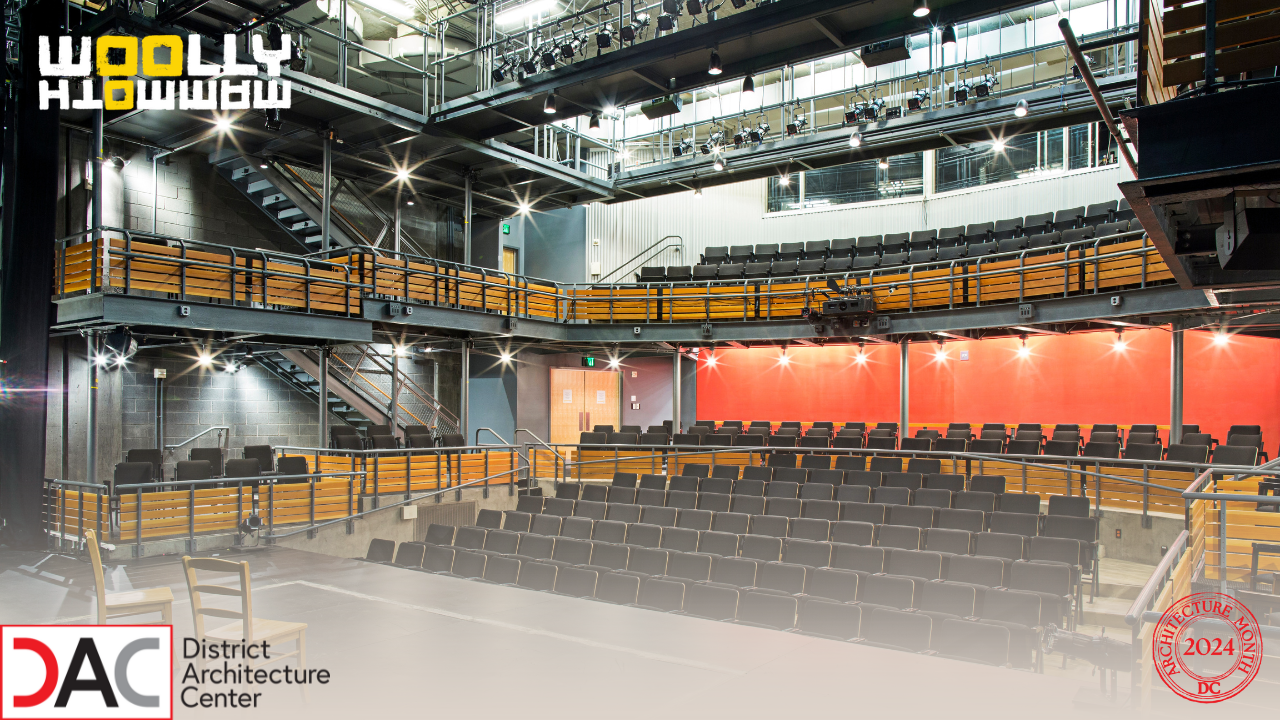-
Date
Wednesday, October 02 2024
-
Time
1:00pm - 2:00pm
-
Location
Please join us for a historic building tour of the beautiful Woolly Mammoth Theatre Company.
Come celebrate as Woolly Mammoth approaches a milestone of nearly 20 years in their building, as well as Woolly's 45th Anniversary Season. Learn about the history of the Woolly building, and how it grew as the Woolly Mammoth Theatre Company. Along with Woolly Mammoth, we celebrate these milestones and look forward to the bright future ahead!
Speakers include:

Mark McInturff, FAIA, McInturff Architects- Mark McInturff founded McInturff Architects in 1986. The five-person Bethesda based studio is dedicated to the making of modern, highly crafted residential, commercial, and small institutional projects. The size, intentionally kept small, allows for close interaction within the studio and with clients and builders.
While all the work can be characterized as modern, there is no single style. Instead, the aesthetic of each project is tailored to its specific program, location, and client.
The firm has received more than 400 design awards, and has been frequently published locally, nationally, and internationally. The fourth monograph, HomeWork: McInturff Architects, was published in 2023 by the Images Publishing Group.

Howard Shalwitz co-founded Woolly Mammoth Theatre Company in Washington, DC in 1980 and guided the company as Artistic Director for 38 seasons. Under his leadership, Woolly Mammoth grew from a tiny alternative theatre into one of the nation's most influential producers of provocative new plays. He has directed and performed in works by American and international playwrights – at New York Theatre Workshop, Playwrights Horizons, Arena Stage, Portland Center Stage, Milwaukee Rep, Woolly Mammoth, and other US theaters. In 2014 he received the prestigious Margo Jones Award for his lifetime commitment to new American plays. Over the past decade, partnering with CITD, Shalwitz has sought new models for American theatre by engaging with artists in Poland, Hungary, Bulgaria and Russia, and sharing his insights with the US theatre field. Currently he is heading up CITD’s Linkages: Poland project, building new relationships between Polish and American theatre leaders. He teaches in the graduate theatre program at the University of Maryland and is currently working on a book about the language of theatre.

Maria Manuela Goyanes (she/her)- is the Artistic Director of Woolly Mammoth Theatre Company. Prior to joining Woolly, she served as the Director of Producing and Artistic Planning at The Public Theater, where she oversaw the day-to-day execution of a full slate of plays and musicals at the Public’s five-theater venue at Astor Place and the Delacorte Theater for Shakespeare in the Park. Earlier in her career at The Public, she managed some of the theater’s most celebrated productions, including Hamilton by Lin-Manuel Miranda, Josephine & I by Cush Jumbo, Straight White Men by Young Jean Lee, Barbecue by Robert O’Hara, and Here Lies Love by David Byrne and Fatboy Slim. While at The Public, Maria also held a position on the adjunct faculty of Juilliard and curated the junior year curriculum of the Playwrights Horizons Theater School at NYU. She has guest lectured at Bard College, Barnard College, Brown University, Columbia University, Juilliard, the National Theater Institute at The Eugene O’Neill Theater Center, UCSD, the University of Texas-Austin, and Yale University, among others. Since 2015, Maria has also served as a member of the board of the National Alliance for Musical Theatre. From 2006 to 2008, she co-chaired the Soho Rep Writer/Director Lab with Jason Grote, and from 2004 to 2012, Maria was the Executive Producer of 13P, one of her proudest achievements. Maria is a first-generation Latinx- American, born to parents who emigrated from the Dominican Republic and Spain. She was raised in Jamaica, Queens, and has a collection of hoop earrings to prove it. She earned her Bachelor of Arts in 2001 from Brown University.
Learning Objectives:
- Discuss how the Woolly Mammoth Theatre utilizes the design of the building it resides in to promote cultural, progressive, and artistic programs in the local community.
- Gain in-depth knowledge on the design process and choices made when creating an open concept theatre known as a "transparent theatrical laboratory", that is focused on artistic programming and community engagement.
- Identify how to encourage community engagement through the design process, such as increased accessibility and a variety of space types (such as a workshop room and theatre) to increase occupant comfort while maximizing capacity.
- Explore the advantages of designing a community-focused space with an emphasis on health, safety, and well-being,
Organized by:
The District Architecture Center in partnership with Woolly Mammoth Theatre Company
The Tony Award®-winning Woolly Mammoth Theatre Company creates badass theatre that highlights the stunning, challenging, and tremendous complexity of our world. For over 40 years, Woolly has maintained a high standard of artistic rigor while simultaneously daring to take risks, innovate, and push beyond perceived boundaries. One of the few remaining theatres in the country to maintain a company of artists, Woolly serves an essential research and development role within the American theatre. Plays premiered here have gone on to productions at hundreds of theatres all over the world and have had lasting impacts on the field. Currently co-led by Artistic Director Maria Manuela Goyanes and Managing Director Kimberly E. Douglas, Woolly is located in Washington, DC, equidistant from the Capitol and the White House. This unique location influences Woolly’s investment in actively working towards an equitable, participatory, and creative democracy.
Woolly Mammoth stands upon occupied, unceded territory: the ancestral homeland of the Nacotchtank whose descendants belong to the Piscataway peoples. Furthermore, the foundation of this city, and most of the original buildings in Washington, DC, were funded by the sale of enslaved people of African descent and built by their hands.

